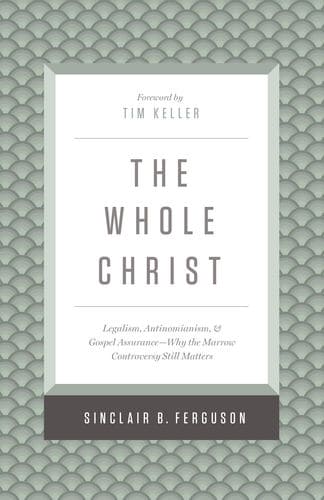⏱️ Estimated Reading Time: 5 min read
One of the most discussed, debated, and debilitating questions of the Christian life has become, “How now shall I live?” It’s debilitating because sadly, our view of life in Christ is often fuzzy, and we are prone to wander into uncertainty for many seasons. We often might ask ourselves questions like the following: “Am I being obedient enough? Does this matter since I’m saved anyway? Am I for sure I am justified before God?” So many of these questions and more like it have the potential to erode away our hearts and minds, if we do not make ourselves aware of the blind spots we may actually have when it comes to the Christian life.
This is not a new internal and external conversation we have, however. The questions of what life in Christ looks like have been a hot topic for centuries, and they only intensified during the Marrow Controversy, a debate from the early eighteenth century in Scotland, centered around Edward Fisher’s Marrow of Modern Divinity. The discussions and disagreements that arose out of this work’s prominence were focused on how we should properly distinguish law vs. gospel, and out of it were born accusations of one side committing high legalism, the other side high antinomianism. Today, the “law vs. gospel” conversation is still prevalent, and the terms “legalism” and “antinomianism” continue to grow more ambiguous and less identifiable by our churches’ theology.
In The Whole Christ, Sinclair Ferguson has labored to bring us an unequaled, unparalleled examination of these themes, and has succeeded. I cannot think of a book I have read prior that has dealt with these particular issues with as much clarity, exegesis, and application like this one. This is a book you can not afford to miss, whether you’re intrigued by the Marrow Controversy and its figures (i.e. Thomas Boston), or you’re curious about these particular doctrines, or just trying to understand how the Christian life should operate and feel according to Scripture.
One of Dr. Ferguson’s key points, as Keller prefaces for us, is that legalism and antinomianism, though seeming opposites, are rooted in the same flaw: divorcing the law of God from the person of God. Ferguson writes:
“Although in one sense antinomianism is the ‘opposite’ error from legalism, in another sense it is the ‘equal’ error, for it similarly abstracts God’s law from God’s person and character (which undergoes no change from old to new covenant). It fails to appreciate that the law that condemns us for our sins was given to teach us how not to sin.” (141)
This thesis statement is the whole of what Ferguson tries to get at in The Whole Christ. Both of these errors illustrate an inadequate understanding of the intentions of God’s good law, and further, of God’s good person. The solution, then, is not for us to abandon the ship of legalism and get in the ship of antinomianism, nor vice versa. There is a much better way for us to understand the law, how the gospel fulfills (without destroying) that law, and how we should respond. Ferguson’s careful balance between these two polemical ideas is brilliant, with some excellent exegesis backing his claims, and much time spent interacting with various Reformers and Puritans, such as Thomas Boston, John Calvin, John Owen, and the writers of the Westminster Confession of Faith.
But it’s not just this “law vs. gospel” distinction Ferguson seeks to address. He also spends quite a bit of time talking about Christian assurance, an important doctrine that frequently suffers at the hands of extreme legalism or extreme antinomianism.
In typical Sinclair fashion, this book is littered with power-packed statements made about various doctrines, even on doctrinal matters not being primarily addressed. Here are some of my favorite “sound-bite” moments from the book:
“Repentance isn’t the punctiliar decision of a moment but radical heart transformation that reverses the whole direction of life” (100)
“Grace highlights legalism’s bankruptcy and shows it is not only useless; it is pointless; its life breath smothered out of it.” (110)
“Neither conviction nor the forsaking of sin constitutes the warrant for the gospel offer. Christ himself is the warrant.” (59-60)
“Christian assurance is not self-assurance and self-confidence. It is the reverse: confidence in our Father, trust in Christ as our Savior, and joy in the Spirit as the Spirit of sonship, seal of grace, and earnest of our inheritance as sons and daughters of God. When these are the hallmarks of our lives, then the grace of the Lord Jesus Christ has come home to us in full measure. And that, surely, is one of the great needs of our times.” (226)
Overall, Ferguson’s book is one of a kind. This is perhaps my favorite work by Ferguson yet, and as stated above, I think this is the perennial treatment of this subject of all the works I’ve seen. It is an exemplary work deserving of the Church’s attention, and I cannot commend it to you enough.



